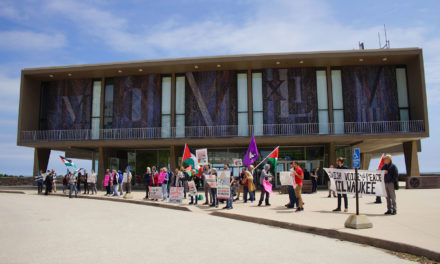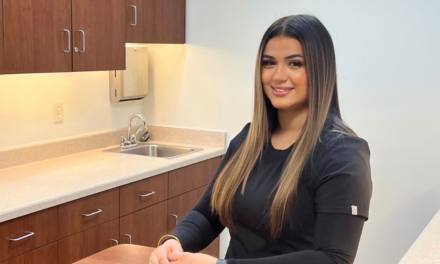Photo ©:
Ramadan, Islam’s holiest month, converges this year with Earth Month, a time designated to inspire protection and conservation of the natural world as we anticipate Earth Day, globally celebrated on April 22.
To mark this intersection of faith and responsibility, the Wisconsin Muslim Journal celebrates the work of one of Wisconsin’s leading champions of the environment, Huda Alkaff of West Bend. She shares some ways we can all help save the planet.
Fighting for environmental justice
Alkaff is one of 12 people of faith nationwide recognized by the White House in 2015 as “Champions of Change” for their efforts in protecting the environment and communities from the effects of climate change.
When the United States Environmental Protection Agency Administrator Michael Regan and his staff held an online meeting last week with Environmental Justice Leadership Forum members to discuss environmental justice priorities and issues, Alkaff was there to share Wisconsin’s environmental and climate justice issues.
The Environmental Justice Leadership Forum is a national coalition of 54 environmental justice organizations working together to advance climate justice and impact policy to ensure the protection and promotion of communities of color and low-income communities through the U.S. Wisconsin Green Muslims, which Alkaff founded in 2005, has been a member of the national Environmental Justice Leadership Forum since 2019.
Wisconsin Green Muslims is “a state-wide grassroots environmental justice group that connects faith, environmental justice, sustainability and healing through education and service. It addresses environmental justice issues related to climate change, clean air and pure water, healthy food, solar energy and energy efficiency, waste reduction and transportation equity,” according to its website.
“It intends to educate the Muslim community and the general public about Islamic environmental teachings, to apply these teachings in daily life and to form coalitions with others working toward a just, healthy, peaceful and sustainable future,” Alkaff explained. “Our work is guided and inspired by the sacred teachings from the Qur’an and the Hadith, reports on the sayings and traditions of Prophet Muhammad, God’s peace and blessings be upon him.”
Alkaff is also a founding member of the Interfaith Earth Network and Wisconsin Interfaith Power and Light, and serves on the national Greening Ramadan Task Force, the Milwaukee Environmental Consortium Board of Directors and the Midwest Renewable Energy Association Board of Directors. She is an activist and advocate with Milwaukee Inner-city Congregations Allied for Hope (MICAH) and the Milwaukee Equity and Climate Alliance, and a planning team member of the Milwaukee Environmental Justice Roundtable.

Huda Alkaff is the founder and director of Wisconsin Green Muslims.
As a founding member of the Islamic Society of North America Green Initiatives Team, through a partnership between ISNA and the U.S. Environmental Protection Agency’s ENERGY STAR program, Alkaff has worked to provide information to mosques and Islamic schools across America to reduce energy, water and operating expenses in their buildings, as well as emissions from transportation.
She has also served as a Wisconsin Field Organizer for the Climate Action Campaign. She co-chaired the U.S. Climate Action Network 100% Equitable Renewable Energy Action Team.
Sally Callan, a long-time community activist and advocate for the environment, has worked with Alkaff through “a number of networks, projects and organizations,” most recently in the Coalition on Lead Emergency (COLE). “Part of what we are working on is education for the community around these issues. As a part of her interfaith work, Huda has become an important resource to people in the community. She broadens our resources through the many things she does.”
“I admire Huda for her strong leadership, which has not always been readily recognized as a woman and as a Muslim,” said Dianne Dagelen, a leader in local, state and regional environmental advocacy and currently a member of COLE. “She has such strength and fortitude. Her recognition by EPA is well-deserved for the dignity that she brings to her representation as a national Environmental Justice Leader. Personally, I have learned much from her, especially for the contributions of the Muslim faith tradition toward protecting the environment and for promoting justice.”
Dagelen was the chair of The Great Waters Group (the Sierra Club Wisconsin Chapter that represents Milwaukee, Waukesha, Ozaukee and Washington counties in southeast Wisconsin, on the shores of Lake Michigan) when it named Alkaff its “Environmental Hero of 2016.”
Why does she do it all?
“At the time of darkness of environmental and climate injustices to the most vulnerable, current and future generations at home and around the world, it is important for us to do everything we can,” Alkaff told WMJ.
“Prophet Mohammed (PBUH) is reported to have said, ‘If doomsday is about to take place while anyone of you has a tree sapling in your hand, which you can cultivate, then cultivate it, for you will be rewarded.’ This message of active hope inspires me and motivates me to plant and tend to the garden of life.
“Personally, I strive to seek the light in the midst of every dark and difficult situation, including this time of climate emergency.”

Growing up green
“When I was a child, I remember being asked the famous question: ‘What do you want to be when you grow up?’ To everyone’s surprise, my answer was ‘an ecologist, an environmentalist,’ even though I did not know what it meant!” Alkaff told WMJ.
“We had a small garden where my parents and I planted vegetables and flowers. I was in charge of taking care of that garden (with help from my parents, of course).
“That garden was a world of discovery and joy for me, a field of experimentation and learning, a grounding in the elements of life, water, sunlight, soil, air, animals, plants, weeds, diseases and my interaction with them—growing food, greenery and beauty. Till now those lovely memories are vivid as I continue to experience the same awe and delight growing food and tending to the garden of life, while centering the divine coordination among all parts of the system,” she said.
Interest in the natural world led Alkaff to earn two undergraduate degrees, one in chemistry and the other in biology. Yet, she yearned for a more interconnected field of study, she said. That desire took her into ecology, “the study of interconnections and interdependence among everything in space and time,” she said.
She earned two master’s degrees, a Master of Science degree in Conservation Ecology and Sustainable Development and a Master of Arts degree in Science and Environmental Education, both from the University of Georgia. In them, there was “a focus on systems ecology and systems thinking that values the big picture story of all its interrelated parts,” she said.
Collaborating with like-minded groups
Alkaff also sees connections between a variety of initiatives to seek environmental justice and to protect and conserve the environment. In addition to Wisconsin Green Muslims being a member of the national Environmental Justice Leadership Forum, Alkaff and her organization engage in multiple collaborations.
Wisconsin Green Muslims coordinates the Wisconsin Faith Communities for Equitable Solar Initiative, which provides solar education, assessment and consultation. It connects with over 6,000 people from 18 different faith traditions and various backgrounds, she said. In this area, she sees “the urgent need for investments toward equity” as “marginalized communities lack access to clean renewable energy and the solar industry has only about 1% women of color represented in it,” she said.
Wisconsin Green Muslims is also a member of the Coalition on Lead Emergency (COLE) and calls for replacing 100% of lead pipes and service lines to protect children and communities of color.

The faith connection
“It is a duty and obligation on Muslims to care for Earth, our common home,” Alkaff said. “God states in the Qur’an (6:165), ‘It is God who has made you viceroys on earth.’
“Some of the Qur’an chapter titles are: The Cow, The Honey-Making Bees, The Light, The Ants, The Spider, The Star, The Iron, The People, The Pen, The Dawn, The Sun, The Moon, The Night, The Day, The Fig, The Elephant, etc. There are many stories, signs (Ayyat) and lessons in Islamic teachings.
“In Islam, there are clear teachings and signs about the important, beautiful and intricate balance of creation,” she said. “God repeatedly tells us to maintain that balance and not to upset the order in creation.
“Muslims are advised to be moderate in every aspect of life. In the Qur’an (7:31), it says, ‘O Children of Adam … eat and drink: but waste not by excess, for God loveth not the wasters.’ Prophet Muhammad (PBUH) forbade a person to waste water even in washing for prayer on the bank of an abundantly flowing river.”
How we can help save the planet
To make the most of this opportunity to link your Ramadan celebration with Earth Month and learn more about how you can help save the planet, one resource is the Wisconsin Green Muslims’ Green Ramadan Daily Tips. It offers 30 daily actions you can take as an individual or a family over this holy month to enhance our spirituality and compassion for the poor, needy, hungry and thirsty, for people, the planet, and all life, while reducing our ecological footprints and consumption impacts.
Daily actions are posted on @WIgreenMuslims social media.
Or participate in upcoming events:
- Tuesday, April 13, 10:30 a.m. – 12:30 p.m.: Multi-solving for Equitable Community Climate Solutions. RSVP
- Wednesday, April 14, 5:30 p.m., Huda Alkaff, Founder and Director, Wisconsin Green Muslims co-presents at Earth Month 2021: Equitable Energy Investment: Clean Energy, Green Jobs, & Community-Based Projects
- Sunday, April 18, 1:00 p.m., Huda Alkaff, Founder and Director, Wisconsin Green Muslims is presenting at Interfaith Imperatives for Climate Action.
- Tuesday, April 27, 5:30 pm: Wisconsin Green Muslims in collaboration with the Interfaith Earth Network of Southeastern Wisconsin, Interfaith Conference of Greater Milwaukee are hosting an Amazing Faiths Earth Circle.

You may also like to participate in or learn more about some of Wisconsin Green Muslims’ current projects:
- Open Circle of Diverse Monthly Themes: A theme is designated for each month and various constituents can join the open circle at the point of entry that matches their interest.
- Faithful Climate Action Fellowship: A 9-month study, leadership training and action from March through November 2021 that provides young Black, Indigenous and People of Color faith and climate leaders in the Midwest and Southeast, with both peer leaders and professional mentors that will guide them in developing their own voice as a faith and climate activist.
- Wisconsin Faith Communities for Equitable Solar: Community-based renewable energy efforts that promote racial and economic equity and work to build community ownership and control of renewable energy resources, with a focus on solar energy.
- Two interfaith initiatives (“Wisconsin Faith and Solar” and “Faithful Rainwater Harvesting”): Peer-learning and education, assessments to advance equitable solar and solutions to flooding. Both initiatives have three components: 1) a social and educational component, where we are building a peer learning circle of those who have built solar or green infrastructure and those aspiring to do so; 2) the financial component, where we provide free and discounted remote and on-site solar assessments and consultations; 3) the spiritual component.














